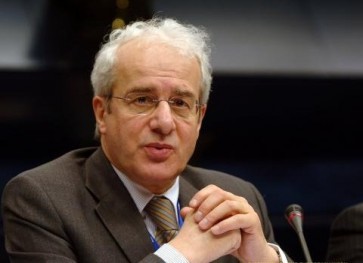PHILIPPE DE BUCK:EMPLOYERS AND UNIONS MIGHT DISAGREE ON MANY THINGS BUT WE HAVE ONE COMMON AND OVERRIDING OBJECTIVE: GETTING OUT OF THIS CRISIS AND CR
Tripartite Social Summit - 17 October 2011
Speech by Philippe de Buck, Director General of BUSINESSEUROPE
- The last few Tripartite Summits took place in challenging economic circumstances but perhaps never quite so dramatic as now. We therefore understand that the European Council has been postponed in order to find a solution to the Eurozone crisis. And we accept that this has some consequences for our meeting. The real priority now is to put an end to this governance crisis and confidence crisis.
- The economic situation has worsened during the summer. We observe a vicious circle of political indecision feeding financial market instability, in turn damaging short-term consumer and business confidence. Unemployment stabilising at almost 10% (or 23 million people) is a major concern. But there is some cause for optimism. Businesses have already created over half a million jobs this year. Compared with one year ago, unemployment fell in sixteen Member States (with drastic falls in the Baltic countries in particular).
- That being said, the situation of young people remains critical. Many of the five million young unemployed are at risk of becoming part of a "lost generation". We heard President's Barroso's call on companies to make a special effort to provide apprenticeships. That is exactly what employers are doing. And many companies are willing to do more. But they cannot do it alone. More effective education and better support for and partnership with business are essential. We are ready to explore with you at EU level the idea of a Youth Opportunities Initiative. But this must be more than a symbolic action. It must add real value.
- What can we expect from the social dialogue at EU level? The social dialogue certainly has proven its worth. While there are limits to what we can do, we are committed to its future. Tackling the employment challenge should be our number one priority. Employers want to get the 10 million people who have been unemployed for between 6 months and two years back into work. But we will need to be creative.
- BUSINESSEUROPE set out in a publication 'Putting Europe to work' what needs to be done. We advocate on the one hand labour market liberalisation and reform of benefit systems. On the other hand, we call for measures to improve skills and job matching to help drive productivity. 'Flexicurity' as its often termed.
- Everybody agrees that we need economic growth to bring down unemployment. We will publish a full update of our economic forecast next month. We expect EU growth for this year likely to be lowered only very marginally from the 1.8% growth we predicted in spring. But we are much less optimistic about 2012 because of continuing political uncertainty. In acting early and in a coordinated, consistent and decisive way, policy-makers can break the vicious circle and help restore confidence. This must be the stake of the next European and Eurozone Council.
- Our request to the leaders at the European Council is threefold. Firstly, and above all, safeguarding the euro is an absolute must. The euro has not only saved businesses up to €25 billion a year in currency exchange costs. It has been central to driving increases in competition, productivity and growth.
- Secondly, we need to strengthen economic governance to help drive fiscal consolidation and structural reforms in Member States. The agreement on the six legislative proposals to improve Economic Governance is an important step forward. We also fully support the Euro group agreement made on 21st July, particularly the measures to increase the powers of the European Financial Stability Facility and its successor the European Stability Mechanism. But we do not agree with the ETUC that this is all about discipline and attacking social dialogue. Not only are these exceptional circumstances requiring exceptional measures. The six-pack also refers repeatedly to the role of social partners. It acknowledges the need to respect differences in national systems but they have to be monitored and co-ordinated.
- There still is continuing financial market uncertainty. Further action to improve economic governance may therefore well be required. In the short term, we fully support efforts to recapitalise the financial system to both increase financial stability and help drive investment.
- Thirdly, we ask the Commission and government leaders to focus on taking forward a small number of proposals which can really help drive growth. Achieving the 75% employment rate by 2020 means that companies will have to create 17.6 million jobs. This is a daunting challenge. If the Commission is serious about this strategy, it should do everything it can to achieve this target. We don't need a proposal that will make it harder for companies to restructure. We don't need new solvency requirements for occupational pensions that will lead to scheme closures and less investment. And we don't need a Financial Transactions Tax, when the Commission's own analysis has shown the potential damage to growth and jobs. But we need: full implementation of the services directive and of the Digital Agenda; accelerating negotiations on free-trade agreements with high-growth partners; and a "Horizion2020" framework programme for research and innovation which is focused on growth.
- Our fate and future prosperity depend on how we manage the next few weeks and months. The responsibilities and stakes are gigantic. Employers and unions might disagree on many things but we have one common and overriding objective: getting out of this crisis and creating a stronger Europe.
Readed: 525






